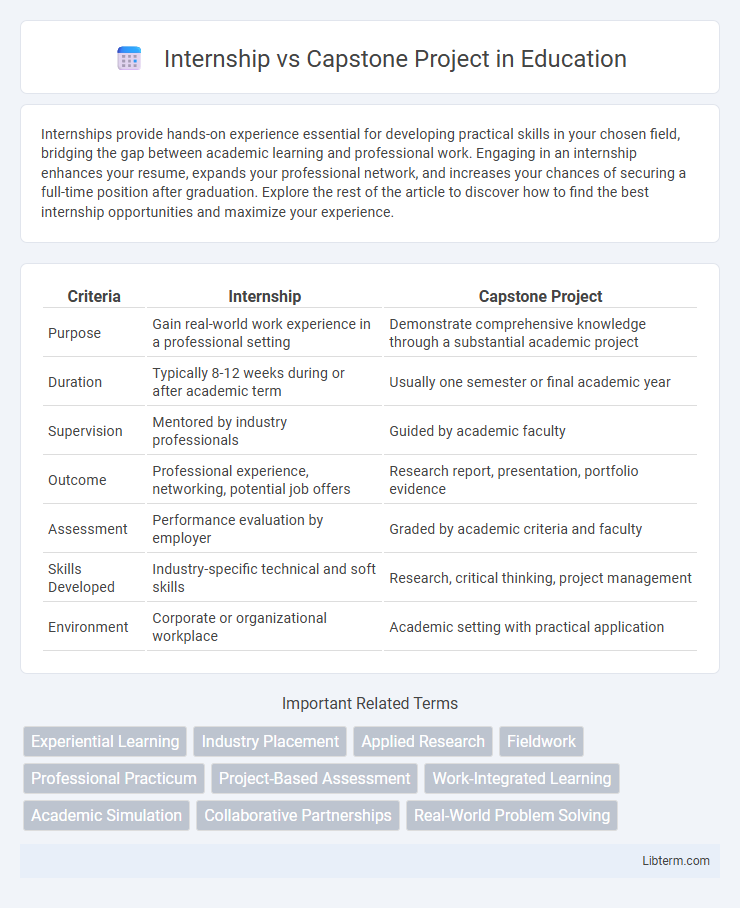Internships provide hands-on experience essential for developing practical skills in your chosen field, bridging the gap between academic learning and professional work. Engaging in an internship enhances your resume, expands your professional network, and increases your chances of securing a full-time position after graduation. Explore the rest of the article to discover how to find the best internship opportunities and maximize your experience.
Table of Comparison
| Criteria | Internship | Capstone Project |
|---|---|---|
| Purpose | Gain real-world work experience in a professional setting | Demonstrate comprehensive knowledge through a substantial academic project |
| Duration | Typically 8-12 weeks during or after academic term | Usually one semester or final academic year |
| Supervision | Mentored by industry professionals | Guided by academic faculty |
| Outcome | Professional experience, networking, potential job offers | Research report, presentation, portfolio evidence |
| Assessment | Performance evaluation by employer | Graded by academic criteria and faculty |
| Skills Developed | Industry-specific technical and soft skills | Research, critical thinking, project management |
| Environment | Corporate or organizational workplace | Academic setting with practical application |
Introduction to Internship and Capstone Project
An internship provides practical work experience in a professional setting, allowing students to apply academic knowledge to real-world tasks and develop job-related skills. A capstone project is a culminating academic assignment where students synthesize learning from their coursework to solve a complex, often research-based problem. Both experiences enhance employability, with internships emphasizing hands-on industry exposure and capstone projects showcasing analytical and project management abilities.
Defining an Internship
An internship is a structured work experience program designed to provide students or recent graduates with practical exposure to their chosen field, allowing them to apply academic knowledge in real-world settings. It typically involves working under supervision within an organization, offering hands-on tasks that enhance professional skills and industry understanding. Internships often serve as a bridge between education and employment, helping participants build networks and improve career prospects.
What is a Capstone Project?
A Capstone Project is a comprehensive academic assignment that integrates knowledge and skills gained throughout a degree program into a practical, research-based or creative project. It typically involves problem-solving, critical thinking, and applying theoretical concepts to real-world scenarios, culminating in a final presentation or report. Unlike internships, which provide hands-on professional experience in a workplace, Capstone Projects are primarily academic and focus on synthesizing learning outcomes in a controlled environment.
Key Differences Between Internship and Capstone Project
Internships provide hands-on work experience in a professional environment, allowing students to apply theoretical knowledge in real-world settings, while capstone projects involve comprehensive academic research or problem-solving tasks typically completed within the educational institution. Internships prioritize skill development, networking, and exposure to industry practices, whereas capstone projects emphasize critical thinking, integration of learned concepts, and demonstration of subject mastery. The assessment of internships often depends on supervisor evaluation and work performance, whereas capstone projects are graded based on project outcomes, presentations, and academic criteria.
Benefits of Choosing an Internship
Internships provide hands-on experience by immersing students in real-world work environments, enhancing practical skills and professional networks. Exposure to industry tools and workflows during internships increases employability and offers opportunities for mentorship from experienced professionals. Internships often lead to job offers, making them a strategic choice for students seeking career clarity and direct pathways into their chosen fields.
Advantages of a Capstone Project
A Capstone Project offers hands-on experience by allowing students to apply theoretical knowledge to real-world problems, fostering critical thinking and problem-solving skills. It encourages interdisciplinary collaboration and creativity, enhancing a student's portfolio with a comprehensive, tangible outcome that demonstrates their expertise to potential employers. Unlike internships, Capstone Projects provide structured academic guidance and allow customization to align closely with career goals and academic interests.
Skill Development: Internship vs Capstone Project
Internships provide hands-on experience in real-world professional settings, allowing students to develop practical skills such as communication, teamwork, and industry-specific technical abilities. Capstone projects emphasize critical thinking, problem-solving, and application of academic knowledge to a comprehensive project, fostering independent research and project management skills. Both contribute uniquely to skill development, with internships enhancing workplace adaptability and capstone projects strengthening analytical and integrative expertise.
Career Impact and Opportunities
Internships provide hands-on industry experience, enhancing practical skills and expanding professional networks critical for career advancement. Capstone projects demonstrate problem-solving abilities and subject mastery, showcasing a candidate's readiness for specialized roles. Both experiences significantly boost employability, but internships often offer direct pathways to job offers through employer connections.
Which Option Suits Your Career Goals?
Choosing between an internship and a capstone project depends on your career goals and desired skill development. Internships offer practical, real-world experience in a professional environment, ideal for gaining industry connections and hands-on skills relevant to specific job roles. Capstone projects emphasize independent research and problem-solving, suitable for careers focused on innovation, critical thinking, and academic achievement.
Conclusion: Making the Right Choice
Selecting between an internship and a capstone project depends on individual career goals and learning preferences; internships offer hands-on industry experience and professional networking, while capstone projects emphasize research, problem-solving, and academic application. Understanding the desired skill set and future job market trends is crucial for making an informed decision. Choosing wisely ensures effective career development and enhances employability in targeted fields.
Internship Infographic

 libterm.com
libterm.com